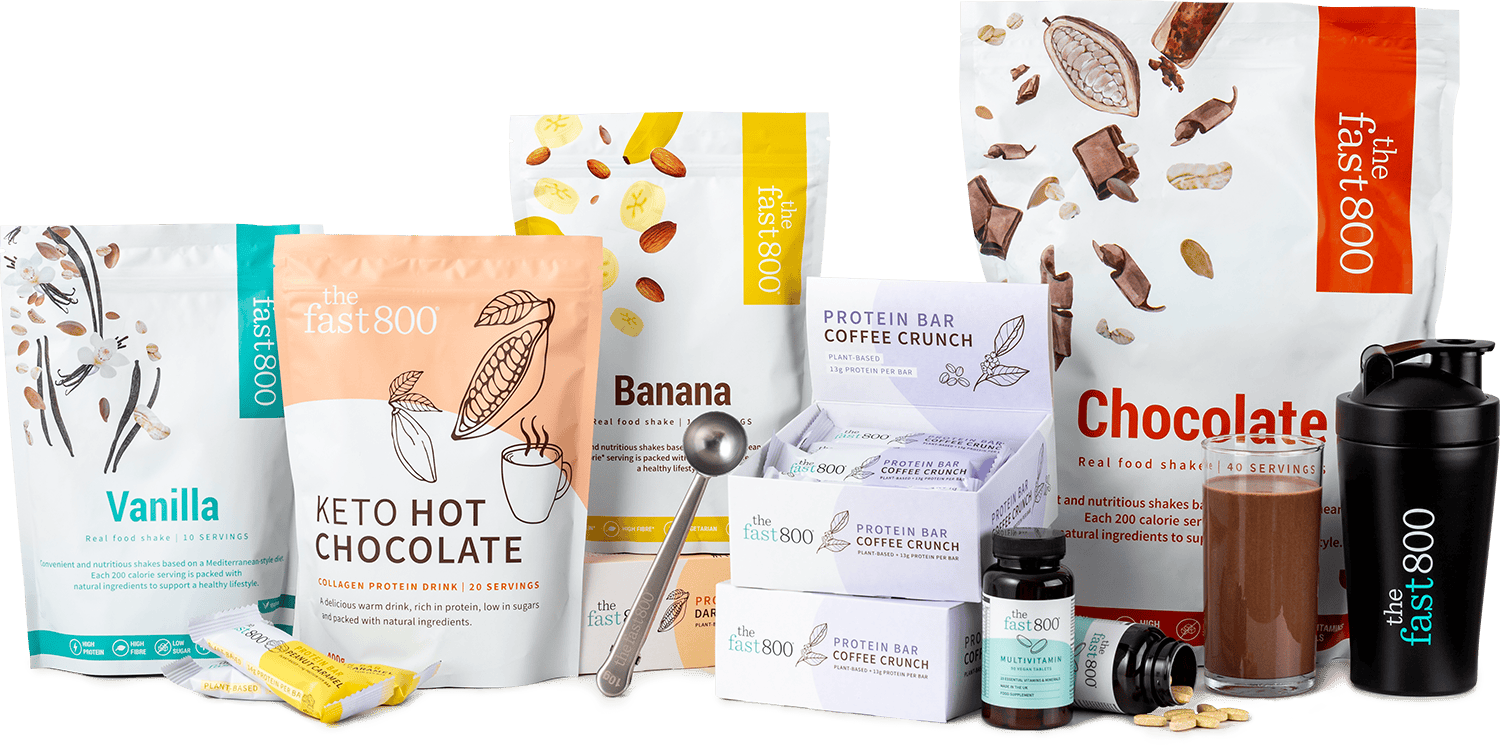Lessons from Dr Michael Mosley: Diet
Dr Michael Mosley has left an incredible legacy that will continue to inspire a movement for better health. We will honour his legacy by reflecting on the lessons Michael taught us, covering topics including food, sleep, fasting, exercise, and the secrets to leading a happy life.
Dr Michael Mosley focused much of his life’s work on when and what to eat for optimal health and to reduce the risk of life-limiting diseases like type 2 diabetes. In addition to his pioneering work on intermittent fasting, Dr Mosley was at the forefront of popularising the Mediterranean-style diet as a way of maintaining good health and weight.
Along with his wife, Dr Clare Bailey, he published best-selling books and cookbooks on the subject, as well as taking part in documentaries and publications on the importance of a good diet. Explaining the science behind nutrition and diet in simpler terms has influenced many people to change their lives for the better, and we’d like to share some of the lessons we’ve learned from Dr Michael Mosley on diet.
Join our email community
Learn more about The Fast 800 approach to healthy living by receiving our free content, health tips and recipes as well as exclusive offers, delivered straight to your inbox.
What Dr Michael Mosley taught us about diet
1. The Mediterranean diet is one of the healthiest out there: Dr Mosley stated that “when it comes to what you are eating, the best evidence is that you should follow a Mediterranean-style diet while adding in some fermented foods. [It] is widely accepted as one of the healthiest diets on the planet.” The Mediterranean diet is rich in foods like whole grains, olive oil, oily fish, full-fat yoghurt, vegetables and legumes. Its focus on fibre, healthy fats and quality protein means it provides all the nutrients your body needs to combat disease and obesity. Dr Mosley enforced that “it could cut your risk of heart attack or stroke by around 30% and reduce your risk of developing type 2 diabetes by 50%.”1 These are just some of the reasons that Mediterranean-style diet principles are at the heart of what we do at The Fast 800.
2. Full-fat dairy increases your satiety, not your weight: Although we’ve historically been led to believe that reduced fat products limit weight gain, Dr Mosley advocated for sticking to the full-fat alternatives. He shared a full article on the topic here, reflecting that “a large number of studies demonstrate that full-fat milk drinkers not only tend to be slimmer than those on lower-fat varieties, but also have a lower risk of metabolic syndrome.”2 Full-fat dairy contains 90 times as much omega-3 fats as reduced-fat alternatives, as well as more vitamins and nutrients that are otherwise stripped out during the fat removal process, all of which contribute to full-fat being more satiating and nutritious than low-fat alternatives.
3. Prioritise eating at least 60g of protein a day: Dr Mosley advised to “include plenty of healthy protein and fibre in every meal as this is going to help you feel satiated for longer, and result in a greater and more sustained amount of both energy and focus.” Eating good quality protein like chicken, oily fish, eggs, legumes, whole grains or tofu helps keep your muscles, bones and weight healthy. Consuming 60g of it per day has been shown to lower your risk of osteoporosis and cardiovascular disease, speed up injury recovery, and lower your blood pressure, as well as assist with healthy weight loss.3, 4, 5, 6
4. Fibre plays an important role in your diet: Fibre is a form of indigestible carbohydrate, essential for maintaining a healthy digestive system. It feeds the ‘good’ bacteria in the gut which in turn help to control your blood sugar, immune system, brain function and weight.7 Dr Mosley taught that “as our digestive system is essential for flushing out toxins and any waste that our body doesn’t need, it can lead to a host of issues if your diet is lacking in fibre.” He, therefore, advised “making some simple switches to your meals – for example, use almond meal instead of flour, [and] eat your fruit rather than drink it” if you want to reap the benefits that fibre has to offer.
5. Eating breakfast is a personal choice: One of the myths Dr Mosley challenged is that eating breakfast is important for weight management. Studies have shown that whether you eat breakfast or not has no discernable effect on weight loss.8 There is perhaps more research that suggests extending your fasting window further into the day can increase weight loss and improve metabolic health.9 However, Dr Mosley did advise that if you do eat breakfast “opt for eggs, cottage cheese or Greek yoghurt and combine them with low-starch, fibre-rich vegetables or fruit. For an additional health bonus, fermented foods such as yoghurt, sauerkraut or kefir are a great way to boost the good bacteria in your gut microbiome.”
Dr Michael Mosley built his distinguished career around the importance of a healthy diet. He, like others, knew the impact that prioritising the right nutrition and following a Mediterranean-style diet has on health and wellbeing. We’re immensely proud to share his lessons and legacy to ensure his life’s work can continue encouraging more people to make better choices with their diet and their lifestyles.
https://www.nejm.org/doi/full/10.1056/NEJMoa1800389
Holmberg S, Thelin A. High dairy fat intake related to less central obesity: a male cohort study with 12 years’ follow-up. Scand J Prim Health Care. 2013 Jun;31(2):89-94. doi: 10.3109/02813432.2012.757070. Epub 2013 Jan 15. PMID: 23320900; PMCID: PMC3656401.
Bonjour JP. Dietary protein: an essential nutrient for bone health. J Am Coll Nutr. 2005 Dec;24(6 Suppl):526S-36S. doi: 10.1080/07315724.2005.10719501. PMID: 16373952.
Hannan, M.T., Tucker, K.L., Dawson-Hughes, B., Cupples, L.A., Felson, D.T. and Kiel, D.P. (2000), Effect of Dietary Protein on Bone Loss in Elderly Men and Women: The Framingham Osteoporosis Study. J Bone Miner Res, 15: 2504-2512. https://doi.org/10.1359/jbmr.2000.15.12.2504
Altorf-van der Kuil W, Engberink MF, Brink EJ, van Baak MA, Bakker SJ, Navis G, van ‘t Veer P, Geleijnse JM. Dietary protein and blood pressure: a systematic review. PLoS One. 2010 Aug 11;5(8):e12102. doi: 10.1371/journal.pone.0012102. PMID: 20711407; PMCID: PMC2920332
Russell L. The importance of patients’ nutritional status in wound healing. Br J Nurs. 2001 Mar;10(6 Suppl):S42, S44-9. doi: 10.12968/bjon.2001.10.Sup1.5336. PMID: 12070399.
Ley RE, Turnbaugh PJ, Klein S, Gordon JI. Microbial ecology: human gut microbes associated with obesity. Nature. 2006 Dec 21;444(7122):1022-3. doi: 10.1038/4441022a. PMID: 17183309.
Azevedo FR, Ikeoka D, Caramelli B. Effects of intermittent fasting on metabolism in men. Rev Assoc Med Bras (1992). 2013 Mar-Apr;59(2):167-73. doi: 10.1016/j.ramb.2012.09.003. PMID: 23582559.











